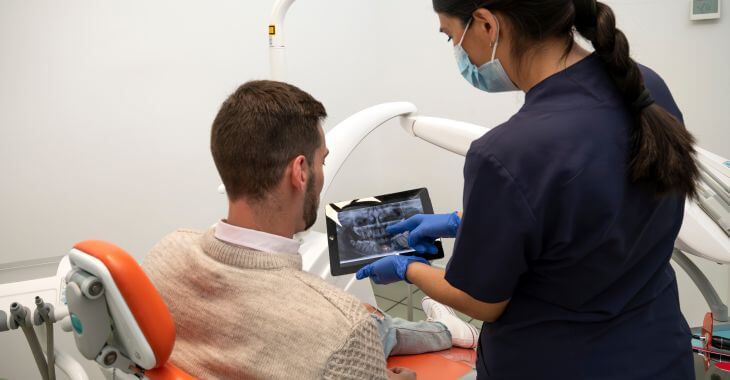Do You Have a Toothache? When to See a Dentist

A toothache can disrupt your work, meals, and even your sleep. While some aches fade with time, others are signals of bigger problems. Knowing when to see a dentist helps protect your oral health, prevent serious complications, and save money on costly treatments down the road.
Common Causes of Toothaches
Tooth pain often comes from cavities, gum disease, cracked teeth, or infections. Sinus pressure, TMJ disorders, or tooth grinding can also be culprits. Since symptoms overlap, a dentist’s evaluation is key. Ignoring the pain may worsen the problem and complicate treatment.
Toothache Home Remedy vs Dentist
Saltwater rinses, cold compresses, and pain relievers may provide temporary relief. But that is the difference between a toothache home remedy vs dentist—only professional care can fix the underlying issue. Without it, pain will likely return and possibly become more severe.
Dental Checkup Signs You Shouldn’t Ignore
Not every dental problem causes sharp pain or a throbbing toothache. Some dental issues have more subtle signs or symptoms, but they still should not be ignored. If you have any of the following, it may be time to schedule a dental checkup:
- Sensitivity to hot or cold
- Bleeding gums
- Bad breath
- Swelling
- Discomfort while chewing
These can be early dental checkup signs. These warnings should prompt a visit before pain escalates into a more serious problem that could cost you more in the long run or jeopardize your oral health.
When to See a Dentist Immediately
How do you know when to see a dentist right away? If tooth pain lasts more than two days, keeps you awake, or comes with swelling, fever, or pus, call your dentist immediately. These are signs of infection. Quick action prevents complications and helps preserve your natural teeth.
Why Infections Should Never Be Ignored
An untreated dental infection can spread beyond your mouth. Bacteria may enter the bloodstream and affect the heart or other organs. Severe swelling can even obstruct airways. Understanding when to see a dentist isn’t just about comfort—it can protect your overall health.
Tooth infections can jeopardize the tooth if left untreated. In many cases, a root canal may be recommended to remove the infected tooth pulp while saving the tooth structure. This can stop the tooth pain and remove the risk of infection spreading to other areas of the mouth or body.
The Cost of Delaying Treatment
Waiting too long often makes matters worse. A small cavity can develop into a large infection, potentially requiring a root canal or extraction. What might cost a few hundred dollars today could escalate into thousands later. Recognizing dental checkup signs early saves both money and pain.
Temporary Relief at Home
While waiting for an appointment, you can rinse with warm saltwater, apply a cold compress, or take over-the-counter medication. These steps highlight toothache home remedy vs dentist: home remedies mask symptoms, but they don’t fix the cause. Long-term relief requires professional care.
How Dentists Treat Tooth Pain
Treatment depends on diagnosis. Cavities may require fillings, gum infections may necessitate scaling, and advanced decay may necessitate root canal therapy. If teeth can’t be saved, extractions are performed. Dentists can address the exact problem—something home remedies can’t achieve.
Preventing Toothaches Through Daily Habits
Strong oral hygiene habits make a big difference. Brushing twice a day, flossing, and using fluoride help protect against decay. Spotting dental checkup signs early and keeping regular cleanings ensures minor issues are treated before becoming emergencies. Prevention is always easier than repair.
How Oral Health Affects Overall Health
Dental problems don’t just stay in your mouth. Gum disease has been linked to heart disease, diabetes, and stroke. That’s why knowing when to see a dentist is about more than comfort—it can safeguard your overall wellness and long-term quality of life.
The Toothache Home Remedy vs Dentist Dilemma
Many people hope the pain will fade with time. Comparing toothache home remedy vs dentist shows why this rarely works. While remedies may reduce pain briefly, professional dental care ensures lasting solutions. Choosing expert care early prevents worsening conditions and future regret.
Top 5 Times to See a Dentist for Tooth Pain
There are a few instances when you should contact a dentist when you have a toothache. Here are the top five:
- Pain lasting longer than two days
- Tooth pain that wakes you at night
- Swelling in the face or gums
- Fever, pus, or foul taste in the mouth
- Pain when chewing or extreme sensitivity
These are the most clear-cut signs for urgent dental evaluation. Many dental offices offer same-day appointments for these types of dental emergencies.

Your Next Steps
If you are in pain, do not wait. Knowing when to see a dentist can protect your smile and your overall health. Call your dentist, schedule a visit, and get lasting relief. Prompt treatment is always better than waiting for things to worsen.
The information provided on this website, including text, graphics, images, and other materials, is intended solely for informational purposes and should not be used as a substitute for professional medical advice, diagnosis, or treatment.




)